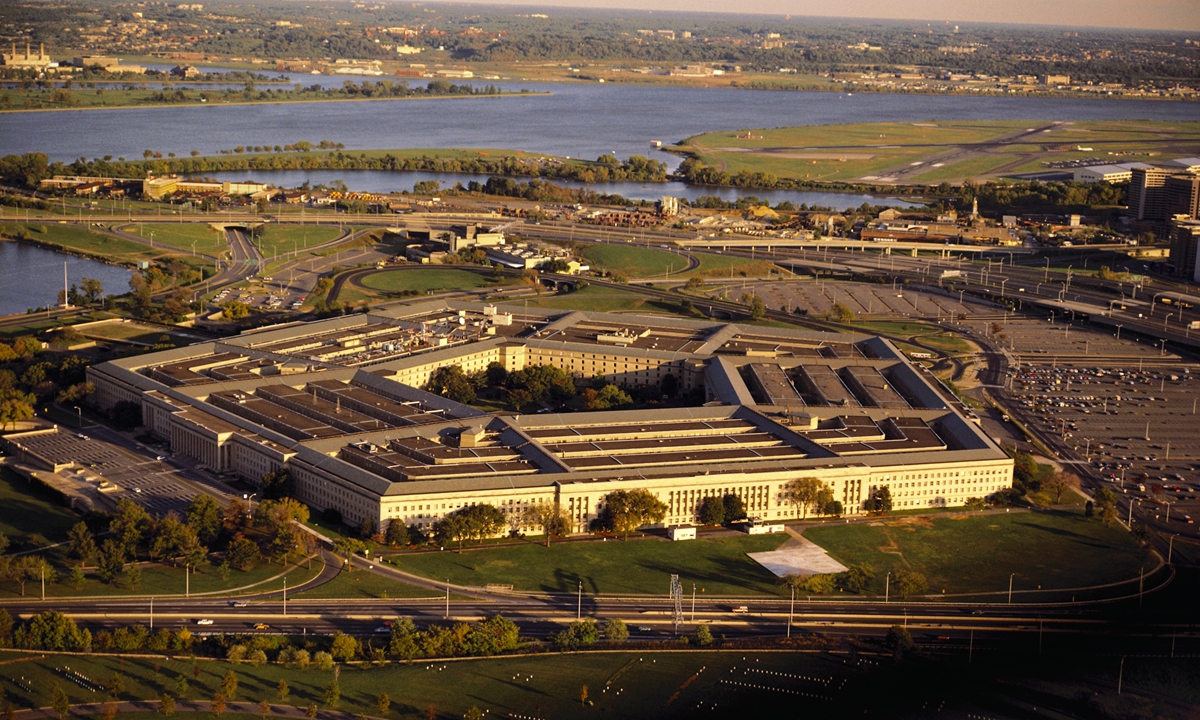US’ report on China’s nuclear warheads is only speculative: Global Times editorial

A view of the Pentagon. Photo: VCG
The US Department of Defense released its annual report on military and security developments involving China on Wednesday. One of the claims in the report has attracted great attention. It notes that the accelerating pace of the China's nuclear expansion may enable the country to have up to 700 deliverable nuclear warheads by 2027 and China likely intends to have at least 1,000 warheads by 2030, 2.5 times more than estimated a year ago.
According to the report, China "is investing in, and expanding, the number of its land-, sea-, and air-based nuclear delivery platforms and constructing the infrastructure necessary to support this major expansion of its nuclear forces" and is building a "nuclear triad."
No one knows the accuracy of the figures tossed out by the Pentagon. Since China's nuclear arsenal is one of the top state secrets, any description of China's nuclear power building by Washington is speculative. The US think tank Federation of American Scientists (FAS) has estimated that China is developing missile silos on a large scale at least three times this year based on commercial satellite photos. But other than blurry satellite images, such claims cannot be supported by other proofs.
The US surely does not want to see China increase its nuclear deterrence. The report says China is likely not seeking a capability to launch an unprovoked nuclear strike, but wants to deter attacks from others by maintaining a credible threat of nuclear retaliation. However, a senior US defense official still said the US is wary of and suspicious about China's intentions to build up nuclear forces.
China is the only major nuclear power that has made the "no first use" pledge. It will not deter non-nuclear countries and regions with nuclear weapons. It also emphasizes that it always maintains its nuclear force at minimum level required for national security. This means China will never engage in a nuclear arms race with the US, or seek to build nuclear arsenal of equivalent scale as the US.
In recent years, Washington has been very concerned that Beijing will increase its nuclear force. They have repeatedly identified some construction projects in northwest China photographed by their satellites as missile silos. This is because they are up to something. They keep increasing military pressure on China, encouraging the Taiwan authorities to take risky and hostile policies against the Chinese mainland, and sending warships and aircraft to the South China Sea for provocation. They know what they are doing will increase China's sense of strategic crisis and possibly spur China to enhance nuclear deterrent. Therefore, they are trying to justify their speculation with a variety of specious information.
We see what is happening this year. The US has kept clamoring that it has found "missile silos" in China again and again. They have created new "China threat theory." In the meantime, they are helping China strengthen its nuclear deterrent. In this regard, it has increased mainly due to the work of US propaganda machinery.
What China should do now is to remain focused. It should not be influenced and disturbed by increasingly intensive voices of the US on China's nuclear weapons. Washington has no accurate information about China's nuclear force building at all, nor does it have method to substantially pressure China over nuclear weapons. They said so in the past year. Now they are saying that again in a bid to release smoke bombs to wage a war of public opinion with China. They are in fact trying to impose more psychological pressure on China.
It's conceivable that the Western media will rush to make an issue of the Pentagon's report, but the Chinese side can totally ignore them. Just let them hype it up. The actual size of China's nuclear power has been always vague. But the repeated hype by the US side will convert the vagueness into an assessment that will make Washington nervous. Isn't this the desired effect that China's nuclear strategy is seeking?
Years ago, one US presidential candidate didn't even know that China is a nuclear country. China's nuclear deterrence was so weak then that it hardly had a role in shaping American society's attitude toward China. It's believed after several rounds of hype by the US side this year, there should be no US elites who don't know China is a nuclear power. Such a change will be beneficial to curbing the impulsiveness of US radical forces toward China.
Whatever Washington says about China's nuclear arsenal, we can just snub them. We should dynamically maintain the nuclear power needed for ensuring our national security and ensuring the credibility of our nuclear deterrence to provide solid support for national security.
